If you ask Myles Richter if he has a secret weapon for recruiting in manufacturing for his frontline and entry-level positions with Lux Architectural Products, he’ll immediately point to recruitment efforts from Workforce Development.
“For us this program has been a hidden gem that we have shared with multiple business contacts, who like us, were struggling to find reliable workers,” says Richter. “It is somewhat perplexing that there seems to be a bit of a labour shortage while capable people are in our own community that only require a second chance at work. It is hard for me to believe that more businesses do not see the benefit of hiring candidates from the Workforce Development program.”
Filling vacancies in manufacturing has been a challenge across the industry, and business owners are seemingly constantly considering new approaches to finding talented and hard-working individuals looking to make an impact with their work. For Richter, that solution has been Workforce Development.
Multiple Successful Hires
Over their first year working with Workforce Development, Richter was able to successfully add three members to his manufacturing team. He worked closely with the Workforce Development team to identify suitable candidates to fill their entry-level vacancies.
“Whenever we are in need of more help, I can email the team and they will send me some potential employees that are either close to or have recently graduated from the program,” says Richter. “It is a bonus for us that the team at Workforce Development knows what we are looking for as well as what kind of roles the candidates would be best suited for within our business.”
It’s not only the employer partners that the Workforce Development team gets to know so closely. The team gets to know each individual program participant on a deeper level to understand their employment and life goals – and how different employers can help them realize their goals. By knowing both the employers and potential employees so well, they can better match opportunities for better business results.

Ready to Make an Impact on your Business and the Community
Beyond the benefit to the business, Richter also recognizes the need to allow people to find work where they will flourish. Having the best of both worlds means he can hire a team of dependable and capable individuals – while also helping people looking to re-enter the workforce and make an impact on their community.
“As a business, we are able to hire capable, reliable people with real life experience and work ethic,” says Richter. “The program provides training courses relevant to their work here such as CPR and First Aid certification and forklift training at no charge to us. From a business perspective, we can hire quality people that are willing and ready to work – but from a personal perspective, we are able to hire decent humans that deserve a second chance in the work force.”
Our Workforce Development program is looking for new employer partners – including ones in the manufacturing, warehousing, and construction industries. Discover how partnering with Workforce Development could help you and your business thrive. Because everyone deserves work that allows them to shine.
When Emcee Construction began renovating our Community Space, it wasn’t necessarily looking to fill in some frontline and entry-level roles on the construction team. But after learning about the Workforce Development program, Construction Manager Corey Wong immediately saw advantages to partnering with this program for recruiting construction workers.
“The process was very easy,” says Wong. “The candidate interviews went very well, and they started right away. Once on-site, they took to the construction environment very quickly.”
Partnering with Workforce Development adds a personalized advantage to recruiting for multiple industries, including construction. We look deeper into each individual’s goals, strengths, talents, and interests to place them in work environments where they will flourish.
Ready to Start Work from Day One
Wong notes that a huge driver for his recruiting through Workforce Development is that candidates are typically already trained and certified – so that’s less time he needs to spend on training and explaining the construction environment.
“Because of the courses taken while in the program, they get a clear idea of what they want to do, and we don’t end up with someone who, once on the job, decides they don’t want to be there, and that’s just lost time for all involved,” says Wong. “The program creates realistic expectations for the worker and, by getting them access to the certifications that will be required by the employer, they then become very attractive as new hires.”
Certifications that program participants gain through Workforce Development can include construction safety, First Aid and CPR, forklift operations, and more. Because the program participants guide much of their own development, they can work on the goals that are relevant to them – giving program workers the opportunity to find and help individuals through their certifications.

Providing an Opportunity to Excel where it’s Needed Most
On top of all the certifications and other advantages to recruiting construction workers with Workforce Development, Wong fully recognizes how this program helps people not only get back to work – but find work that’s meaningful for them and allows them to excel.
“Because we are a smaller construction company, we have few opportunities for hiring,” says Wong. “To be able to give that opportunity to someone who has in the past struggled to find work, is very gratifying. I remember what it was like when I was young and wanted to get into the construction field with no experience. It can be quite difficult. Our new worker is committed. And once you have good workers you can rely on, you can just concentrate on the work.”
Our Workforce Development program is looking for new employer partners – including ones in the construction, warehousing, and manufacturing industries. Discover how partnering with Workforce Development could help you and your business thrive. Because everyone deserves work that allows them to shine.
To fill his frontline and entry-level positions, LD Filtration’s Vice-President and Partner Dakota Ward typically receives resumes and applications from the usual job websites – but had never received an application from a program like Workforce Development. He explains that after receiving an application from one of the team members on behalf of a program participant, he became interested in what else Bissell Centre’s employment program could offer.
“The team member explained how the program worked and the additional supports from Bissell Centre for the candidate, and how it would assist both the candidate and our company in finding a good fit for our vacancy,” says Ward. “After reviewing the program further and then having a conversation with the team at Workforce Development, we thought it was a win-win for everyone involved, especially helping an individual making life changes and getting back into the workforce.”
Since that first contact with the team, Workforce Development has been a mainstay for Ward and LD Filtration. As a distribution warehouse and manufacturer of filtration products, Ward appreciates the impact the program makes on Edmontonians looking to re-enter the job market.
Trained and Certified with Work in Mind
During the initial portion of the program, participants have the opportunity to pursue relevant training, and Ward more than understands the value of having new team members already trained and certified before they even start. He points to the fork truck operation certification and First Aid/CPR training as incredibly valuable skills that his new hires brought to their first day of work.
“The additional training and certification that candidates receive through this program is incredibly attractive to a recruiter or employer – it surprises me that there aren’t more of these programs out there,” says Ward. “This is a huge advantage as an employer. Training new team members takes time, money and, more often than not, another team member’s time and attention, which short-hands the rest of the crew.”
The training and certification come at no cost to Ward or LD Filtration – and the company is able to save even more money with their new team member’s salary being partially covered by Bissell Centre through a Government of Alberta grant. The additional wraparound services Ward’s newest team member can still access from Bissell further ensures they have everything that they need; so when they come to work, they can put in their best effort.
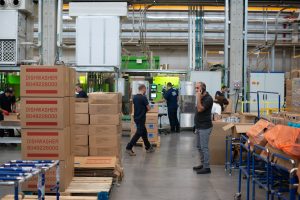
Providing Opportunities to Those Who Need it Most
The best part of partnering with Workforce Development? If you ask Ward, it’s knowing that a new all-star team member who may have not had the opportunity to join the team otherwise now can make an impact with their work. With the myriad of reasons as to why someone might be struggling to find work, Ward knows that all some folks need is their chance to shine and excel.
“If someone in my network asked me my thoughts on it, I would encourage them to push aside any preconceived notions and try out the program – I wish I had sooner,” says Ward. “This program linked us with a great individual who has shown great interest in our company, mission and further career advancement, and we’re very eager to support him through this.”
Our Workforce Development program is looking for new employer partners – including ones in the warehousing, manufacturing, and construction industries. Discover how partnering with Workforce Development could help you and your business thrive. Because everyone deserves work that allows them to shine.
Kari’s eviction notice came swiftly. She had a month to find new accommodations for her and her adult sons with special needs. Unsure how she could find a place on such short notice, Kari considered all her options, from living in a storage unit to even living in her car. Then she remembered a community organization.
“I knew about Bissell Centre—I worked with Bissell Centre while teaching a crafting course,” Kari says. Despite her prior knowledge of the organization, Kari was surprised to learn about the Community Bridge program and how it could help her secure a new home.
As part of the Community Bridge program, Kari was given a $2,000 open-ended, interest-free loan to cover her damage deposit and rent, which she paid back proudly. “I wanted to make sure that resource was there and ready for the next person who needed help.”
A Kokum’s Giving Spirit
This giving spirit is typical for Kari – whose community frequently refers to her as the Community Kokum, or grandmother, providing love, support, and guidance whenever and wherever she can. Even when her pantry was empty and her power shut off, Kari still looked after others and considered her situation manageable.
“I’ve had to flee domestic violence,” says Kari. “While in the shelters, I saw many women in similar situations and how much worse off I could have been. I never saw myself as a victim. I have a lot of resilience that’s helped me through some tough times.”
Prior to reaching out to Community Bridge, Kari faced many uphill battles – especially when it came to where she called home. Kari has moved four times in four years through low-income housing and encountered varying levels of domestic violence and abuse. She’s also struggled with her adult children’s special needs, experienced houselessness while seven months pregnant and underwent multiple medical procedures. Kari tried to push through it without any outside help, but when she needed assistance, she knew Bissell Centre would be there with solutions. However, Kari wasn’t expecting this amount of support from Bissell Centre’s Community Bridge.
“Everything with Community Bridge was no pressure and fell into place seamlessly,” Kari explains. “It took two weeks to learn I had a loan and two weeks after that, I secured my place. I took possession of my new home before I moved out of the last place.”
How Community Bridge Helped Kari
The Community Bridge program is essential to Bissell Centre’s operations. Between April 2022 and March 2023, the Community Bridge program prevented 511 individuals from housing-loss, resulting in 214 households served, with another 202 households assisted with loans. Ensuring people don’t lose their homes and experience houselessness is the team’s top priority – so the first place they look to help folks out is with their current landlords. The team negotiates on behalf of the people they’re helping to prevent any untimely evictions.
When landlords are unable to negotiate any further and eviction is imminent, Community Bridge Support Workers then work directly with the people who need a new place to live, helping make the transition to their new place as seamless as possible.
Partners Make These Programs Possible
A program like this wouldn’t be possible without our partners in the community, like ENMAX. Their support has been crucial for Community Bridge to help people find places to call home.
And as Kari points out, it’s not just finding and funding new spaces that makes this program indispensable – it’s the regular follow-ups and wraparound services that have helped keep her and her family in their new home.
“I think more people should check out Bissell Centre to know what it has to offer,” says Kari. “Without Community Bridge, I would be experiencing houselessness. I never thought I would be in that position. Bissell Centre made sure I still had a place my sons and I could call home.”
Individuals connected to our Fetal Alcohol Spectrum of Services (FASS) program contributed to a book about the challenges and realities of navigating life with Fetal Alcohol Spectrum Disorder (FASD). Under the guidance of Jared Epp, Carleton University PhD candidate and former housing support worker with Bissell Centre, who facilitated the group in sharing stories of what was most important to them. Fifteen people shared their stories, captured in this captivating collection. Born Broken is a book that’s an immersive experience into what it means to have FASD and the barriers it can create.
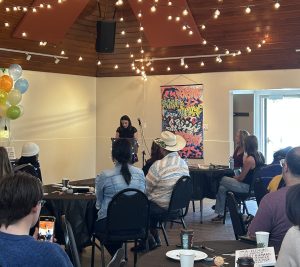
The group celebrated the release of this Born Broken book this past month with a small and intimate reading and sharing. Everyone who contributed to the book received a copy, and a few were shared around the community to help spread its positive message.
Copies of Born Broken books are available to purchase from the Bissell Thrift Shop on 118 Avenue or Paper Birch Books at 10825 95 Street.
Below is the preface to the book, written by Jared Epp. This firsthand experience of seeing the collection come together illuminated the importance of this book for the contributors and for those about to read it and gain a better understanding of FASD.
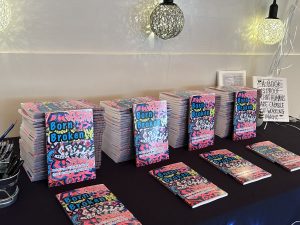
Preface from Born Broken
A group of individuals connected to Bissell Centre’s Fetal Alcohol Spectrum of Services (FASS) came together for a book project. The goal was to provide an opportunity for folks to share whatever kind of content they wanted. Leaving it open-ended allowed the individuals participating in the project to share what was meaningful to them. Their contributions didn’t have to only be about living with Fetal Alcohol Spectrum Disorder (FASD). A number of contributors did want to share their stories about living with FAD, about their daily challenges, as well as the impact of receiving their diagnosis. Others talked about different things. There are stories about adventure on Edmonton’s public transit, sewing denim, dreaming, making music and art, the challenges of finding and keeping a job and many other events and situations the reader will soon encounter.
Woven throughout the book are stories, ideas, frustrations, thoughts and reflections, offering a window into the experience of entering into the world a certain way.
In our last group meeting, we had to come up with a title for the book. Each contributor present was invited to come up with some titles, and then there would be a vote.
These were the title ideas:
- Born Broken
- The Struggle is Real
- Drumbeats of Hope
- Light in the Dark
- Perfectly Imperfect
- Getting Dealt a Bad Hand
Everyone had agreed on Heidi’s subtitle, “Reflections on Life and Resiliency from Individuals living with FASD,” as it put a positive spin on the main title.
Born Broken won by one vote over The Struggle is Real and Light in the Dark. There was a lot of discussion and debate on the chosen title. Some people felt it was too negative, but they also acknowledged it’s sentiment. In many ways, the titles and the debate around it set a theme that echoes through each story: individuals confronting and overcoming something they were born with, have no control over, and yet seems invisible to those outside the lived experience of FASD. The reader is invited to encounter the diverse contributions within the book, keeping in mind the unsettled nature of its title and the realities of living with FASD.
-Jared Epp
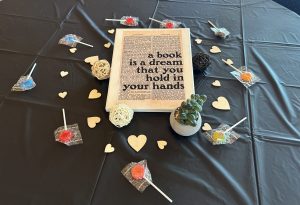
In 2022, Bissell Centre took a long hard look at itself and asked what can be a scary question – what are our 2SLGBTQIA+ team and community members experiencing here? What does Pride at Bissell look like? Are these folks being embraced and celebrated? Are they comfortable being their truest selves here?
41 team members participated in a survey focused on 2SLGBTQIA+ issues – 12 from 2SLGBTQIA+ communities. The results of the survey were promising, and a lot of organizations would take that as a sweeping success and end their efforts there. Instead, we wondered how best to push our organization even further.
Through the results of this survey, summer intern J. Heber looked at the qualitative stats, thought about how they represented the diverse 2SLGBTQIA+ presence at Bissell Centre, and created a fibre art piece to represent that diversity across the organizations.
It is an expression of all the different flags and colours that express the different gender identities and sexual orientations that makeup Pride. Today, it proudly hangs in our Community Space. It stands as a reminder to folks that our diversity is our strength, and inclusion is essential. It also features seeds and the words, “Let’s Grow Together,” demonstrating the seeds of compassion and the thirst for knowledge that helps us all better understand and appreciate one another.
We’re going to let our 2SLGBTQIA+ staff members speak for themselves. Exploring, in their own words, how Bissell Centre is working to improve equity for 2SLGBTQIA+ folks, what their experiences have been like at Bissell, and what Pride month means to them.
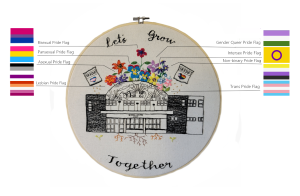
Allen
Bissell Centre gives out free rainbow stickers to everyone. I want to point this out first and foremost. It’s the first thing I think about when I think about how Bissell Centre is a safe space.
I joined Bissell Centre in 2020, and I wasn’t sure if I should be open about my gender identity. I saw a lot of staff here be comfortable and open and safe with who they are. Everyone here makes the effort to use my preferred pronouns (he/him) – and anyone who mistakenly uses the wrong pronouns is quick to apologize and correct it. That makes me feel respected and cared for by Bissell Centre.
Especially compared to my home country, Bissell Centre is welcoming to who I truly am. Here, I get to show my Pride without shame or any fear. I get to be open, and that’s important not just for me but for anyone who wants to express their Pride.
Even our community participants treat 2SLGCTQIA+ people with respect and equality. No one ever has anything negative to say about the clothes we choose, how we present, or how we choose to look according to our gender identity. Having this freedom and acceptance is so important for 2SLGBTQIA+ folks and how we can contribute back to our communities.
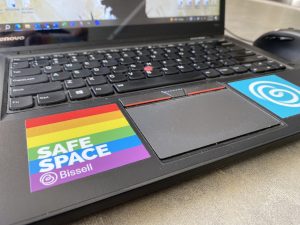
Clinton
When I was placed at Bissell Centre for my social work practicum, I was nervous about entering a new space. Being a member of the 2SLGBTQIA+ community, I am always wary when entering a new space. I don’t know if it’s safe, if I will be harassed or if I can truly be myself.
I remember about a month into my practicum, I mentioned how I noticed there wasn’t really any noticeable visual representation to let new staff and community members know that Bissell is a queer-friendly space. So, we came up with the idea for me to create a 2SLGBTQIA+ resource list for both staff and community members.
Then, I started noticing pride flag stickers placed on doors and laptops. My supervisor told me because I had the courage to identify the gap between Bissell and the queer community, she ordered gender-neutral bathroom signs for the bathrooms in the Community Space. I couldn’t believe that I was a catalyst for these changes. Bissell Centre is not just another group that celebrates pride once a year. They listen to the concerns people have and do what they can to improve.
The community members make Bissell Centre different too. I often get comments that I give off two-spirit energy. I learned that two-spirit folks in Indigenous culture are sacred, which makes me feel honoured. I don’t currently identify as two-spirit – the community members made me curious, and I have since been exploring that side of myself. Because the community members and the staff have created a judgment-free space, it has allowed me to safely be my true self.
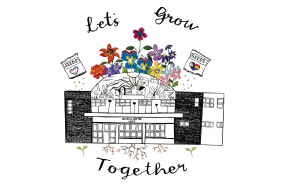
Michelle’s Story About Overcoming Poverty
This is Michelle. She grew up in Edmonton. Whenever Michelle returns to Edmonton, she sits on the curb next to Bissell Centre’s community space. “This is where she sat,” Michelle says. “And I feel like she’s still here. I tell her that I love her whenever I sit here.”
Michelle’s mom regularly visited Bissell Centre, requiring services from drop-in supports to the housing program. “My mom was a residential school survivor, she became addicted to alcohol and drugs over the years. She was the most loving, kind mom before that.”
She sits on the curb, lights the sage in a small cast iron skillet and places her headphones into her ears. She takes a long breath and starts talking to her mom about overcoming poverty. She tells her how she’s taking care of the babies, getting her degree, and working in corporate now – that she’s doing really good.
When Michelle says she’s doing really good, this carries a very heavy weight. This means she’s helping her children heal, providing for her family, and moving forward away from the cycle of poverty she knew. She’s breaking Intergenerational trauma and overcoming systemic oppression. And she’s able to give back.
Another breath and she begins singing. Not starting with a whisper, but right from the bottom of her feet, out her mouth, and reverberating across 96 Street. Wandering up and down the alleyway where her mother passed away, she releases every emotion in her being with every word she sings.
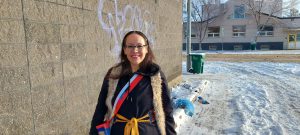
Where Michelle is today
Today, Michelle is a social worker with a background in childcare and Indigenous culture. She now lives in central Alberta. She is part of an Alberta Health Services advisory council, where she regularly attends meetings to help offer better services to all Albertans.
Overcoming poverty was not an easy path. Growing up in poverty and with parents experiencing addiction meant she had to work four times as hard to get where she is today. Michelle was able to find a path that was healthier and more fulfilling for her and her family.
Michelle’s Journey to Bissell
As a child, Michelle (along with her mother and three siblings) left their northern Alberta community to escape toxic family dynamics and domestic violence. The family travelled to Edmonton for a better life. But both of her parents quickly experienced addictions, and it wasn’t long before Michelle’s mother found herself living in Edmonton without shelter.
After she became a parent, Michelle came to Bissell Centre for some basic needs, the child care program, and the parent program. This is where she met childcare worker Fatima and family supports worker Cheryl. Michelle felt honoured that these women heard her story and believed she could one day leave poverty behind – once and for all. It was the first time Michelle felt like her support was nonjudgmental, encouraging, and believed in her goals.
“Being an Indigenous woman, in my experience, was being told to be quiet a lot,” Michelle says. She points out how Bissell’s service delivery approach helped her heal from her trauma. “Many programs [from other service providers] would often parent or monitor my life. Bissell treated me like a person. They gave me wings to fly.”
Michelle and her siblings each had their own challenges with poverty and addiction as they grew into adults. Though Michelle overcame her challenges, much of her family succumbed to their challenges. She honours her only brother’s death in 2015, her youngest sister’s death from COVID in 2022, and her sister-in-law’s death that same year. By 2016, her mother’s life would be cut short by complications due to pneumonia.
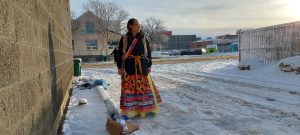
Michelle’s Giving Back
Speaking from her experiences, Michelle thinks trauma is often not openly spoken about. She did not have access to many role models speaking eloquently about the realities of being Indigenous. She’s learning to manage her trauma through post-secondary education, her art, her work as a facilitator, and being a two-spirited leader. She is a strong Indigenous mother teaching her children about their culture, history, customs, and their connections back to the land.
After she finished her ceremony, she walked around the corner to the folks standing in line at the Community Space. Michelle spots an elderly Indigenous woman and gifts her the tobacco. She hears about how her new friend just found her new place to call home. The tobacco will hang in the new home – Michelle’s gift as an act of healing.
Michelle comes back, smiling wide as she cleans from her own healing ritual. She tells us how happy she is for her new friends. “They’re doing really good!”
My name is Fred, and Bissell Centre was a godsend for me.
For many years, I was a welder. When I lost my job, I was completely blindsided. For months, I searched for a new position in my field, but there simply wasn’t work to be found. If you’ve ever lost your job, you know how devastating that experience can be. It’s hard not to take it personally.
I suspect many of you have an inkling of what I went through, spending endless hours applying for jobs, only to be turned away, or worse, not to receive any kind of response at all.
To top everything off, my marriage was on the fritz. I felt like I couldn’t do anything right, no matter how hard I tried. Being part of a dying marriage was incredibly lonely.
I’d hit rock bottom once again. I found myself deeply depressed. I couldn’t stay in that house any longer. I needed space, so I left.
Leaving was important, but I had nowhere to go.
Becoming homeless in Edmonton was overwhelming and very confusing. Was I going to sleep on a park bench tonight? Would I be mugged while I slept? What’s my next step? Thankfully, I was in contact with Alberta Jobs Corps, and they referred me to Bissell Centre for help.
When I walked through Bissell Centre’s doors, I was more than a little uncertain. I didn’t know who to talk to or where to go, and I think the staff noticed that because they approached me, asked my name, and introduced themselves.
I told them a little bit about my situation, and they said, “Well Fred, you’ve come to the right place. Bissell Centre can help.”
That was about a year ago. At Bissell Centre, I’ve found the support of a family. I found people who really care. They gave me food and clothing and helped me find temporary shelter, so I wouldn’t be on the street. Before long, they helped me find affordable housing, too.
I’m a regular participant at the Community Kitchen. It’s almost always a social event. We share our life stories, where we’re going and where we’ve been.
I’ve also attended several of Bissell Centre’s holiday meals. Sometimes, when I was lonely, I came to share dinner with people who treated me well. Every time I did, I felt like I was part of a family. That’s why I’m looking forward to the Thanksgiving dinner.
I’ve come a long way since showing up at Bissell Centre’s door. Becoming homeless in Edmonton wasn’t something I ever expected. I’m now a volunteer with Bissell, so I can pay back all the good things they’ve done for me. I recently was awarded full custody of my son, and that’s been the best development of all.
Thank you for your important contributions to Bissell Centre. They’re doing great work in the community and I know that my life is heading in a new direction, all thanks to them.
It was an injury at work that knocked Scott’s world off balance. It shouldn’t have happened, but it did, leading Scott down an uncertain path. He and his wife, Amy were not able to make ends meet; they were facing an eviction notice and the power and heat were getting disconnected. As self-sustaining people, Scott and Amy were looking for an opportunity to weather the storm they were in, to find a loan and pay it back. They didn’t want social assistance and didn’t know where to turn until they were referred to the Community Bridge program at the Bissell Centre in Edmonton.
“The program is a Godsend,” says Scott. “It is the difference between some people giving up and thinking they would end up on the street and actually giving it another shot and getting back on your feet.”
He made his first re-payment on the 1st of August, which went directly towards a late payment for rent to stave off an eviction notice. It was right down to the wire too and just helped them avoid eviction. A family member was going to lend them the money right before they applied for the Community Bridge program; however, circumstances led to the family member being unable to lend the money. Without the Community Bridge program, Scott and Amy would have been evicted from their apartment.
“When the money came through, it was literally a life saver.” -Scott
Scott feels that it’s easy for people to generalize how difficult it is for others; and often, those who are better-off don’t realize that people going through a tough time don’t have the time or the resources needed to fix problems themselves. They can get bogged down by the system, and Scott feels that it gives peace of mind knowing that there is a program that can help people climb out of the stress and situations they are facing.
“It’s nice to know that you can get help, without going through the wringer to get it,” says Scott. “Dealing with the Bissell Centre, it’s more ‘if we can help you, we will.’ It wasn’t so detail or procedure-oriented, but more ‘let’s get you back on your feet oriented,’ which, at the end of the day is often what people need to hear to not feel like the world is coming to a quick end on them.”
He wishes more people knew about the Community Bridge Program. Having benefitted so much from Bissell Centre’s help, he wants to volunteer and help raise awareness of the incredible work that Bissell does to help people in the community get back on their feet.
Thanks to the support of funding partners like ENMAX, we have been able to help hundreds of people like Scott and Amy avoid eviction.
Visit Bissell Centre’s Housing Services to learn more about the Community Bridge Program and our efforts to provide stable housing and financial support for people living in poverty.
When Mike first came to Bissell Centre, he’d been living on the street for two years. You might have even seen him on the streets of Edmonton. Perhaps you were the woman who looked Mike in the eyes and said, “You need to get yourself help. There are resources to help you.”
Mike grew up in Edmonton in a family of eight. It wasn’t easy growing up in such a big family. They lived in a cramped three-bedroom house, made smaller because his mother was a hoarder, and his parents fought often.
Mike was similar to his father. He was trusting. He always saw the best in people, giving them the benefit of the doubt. If you asked, he’d give you the shirt from his back.
Once he turned 18, Mike worked and lived on his own, at times allowing his siblings, even his mother, to live with him when they struggled to get by.
Eventually, he made the journey from Edmonton to Calgary. There, he worked for years in the construction industry. Unfortunately, his business partner wasn’t trustworthy—he was underpaying and stealing work from Mike.
During this chaotic time, Mike lost his father, and it was like all the air was sucked from his lungs. The loss was devastating. With his life in shambles, he decided to return home.
Sadly, he didn’t receive the help he’d hoped to find back home. That’s when Mike became homeless for the first time. Each day was a constant struggle. No one believed in him and he certainly didn’t believe in himself.
“Give people a reason to believe in themselves again and see what they do with their lives.”
One day, a kind woman approached him on the street, and encouraged him to seek help. That was a life-changing moment for Mike. He began thinking that things could be different.
Mike found his way to Bissell Centre, where he finally got the help he needed. Scona High School had recently raised $115,000 for Bissell Centre, enabling them to form an Outreach Housing Team. Mike became their first ever participant!
With support from the new team, Mike found an affordable apartment, and got access to mental health services. He also found a rewarding sales job. He was so skilled that he soon won top sales awards and he continues to work there today.
Mike is also now working toward a business degree and is set to graduate at the end of this semester! He dreams of working with wood—he loves building things with his hands.
“Without Bissell Centre, I’d most likely be dead. Most people are on the streets because they don’t believe in themselves and no one believes in them,” Mike says. “Give people a reason to believe in themselves again and see what they do with their lives.”
Donors like you have made it possible for Mike to access Bissell Centre’s Outreach Housing Team, along with other resources. Thanks to your support, Mike has moved from poverty to prosperity.
Thank you for helping Mike and others like him to find affordable housing, and step into a brighter future!
Mike story is a feature in our May Newsletter. Read the full newsletter online now.











